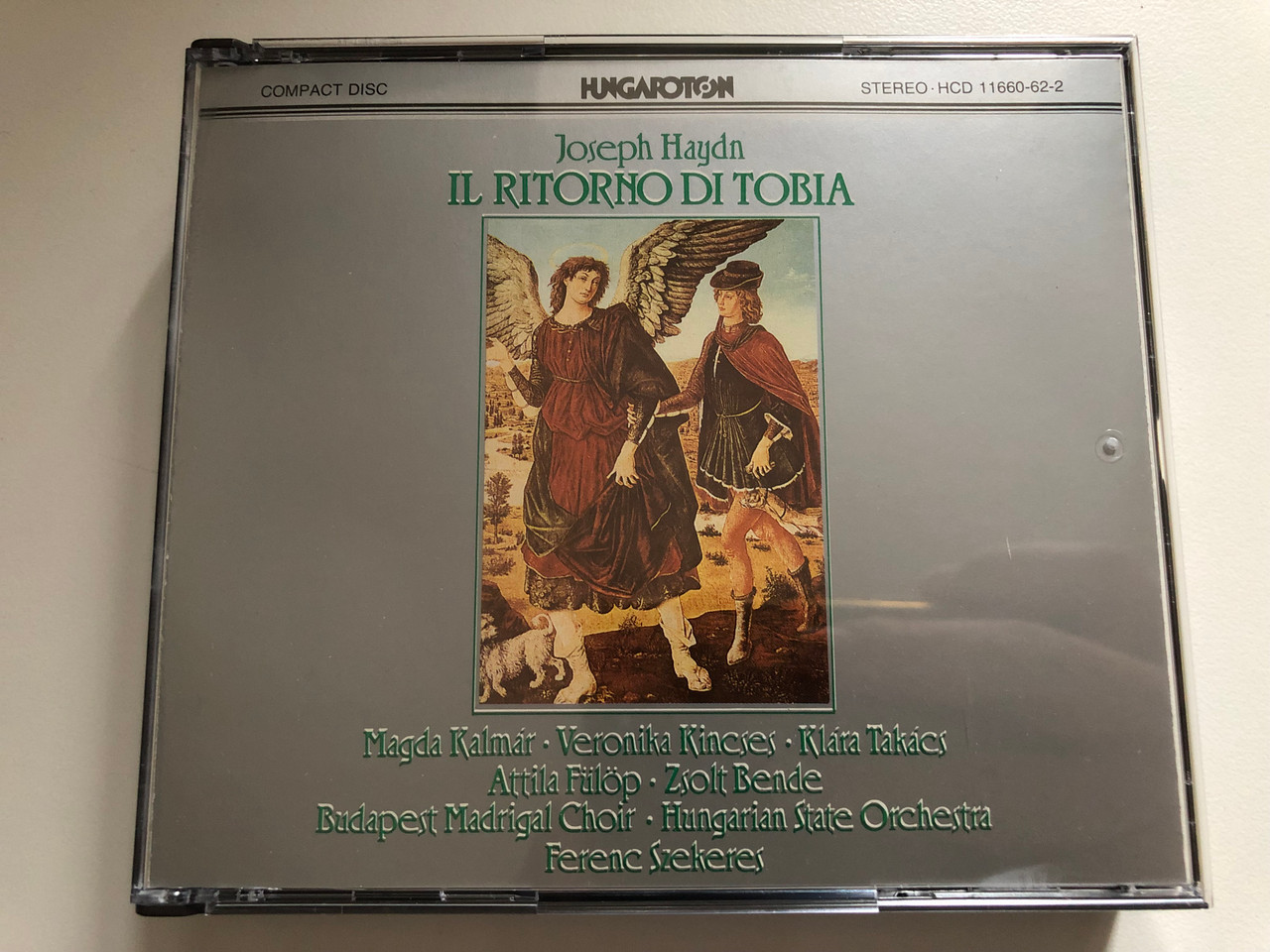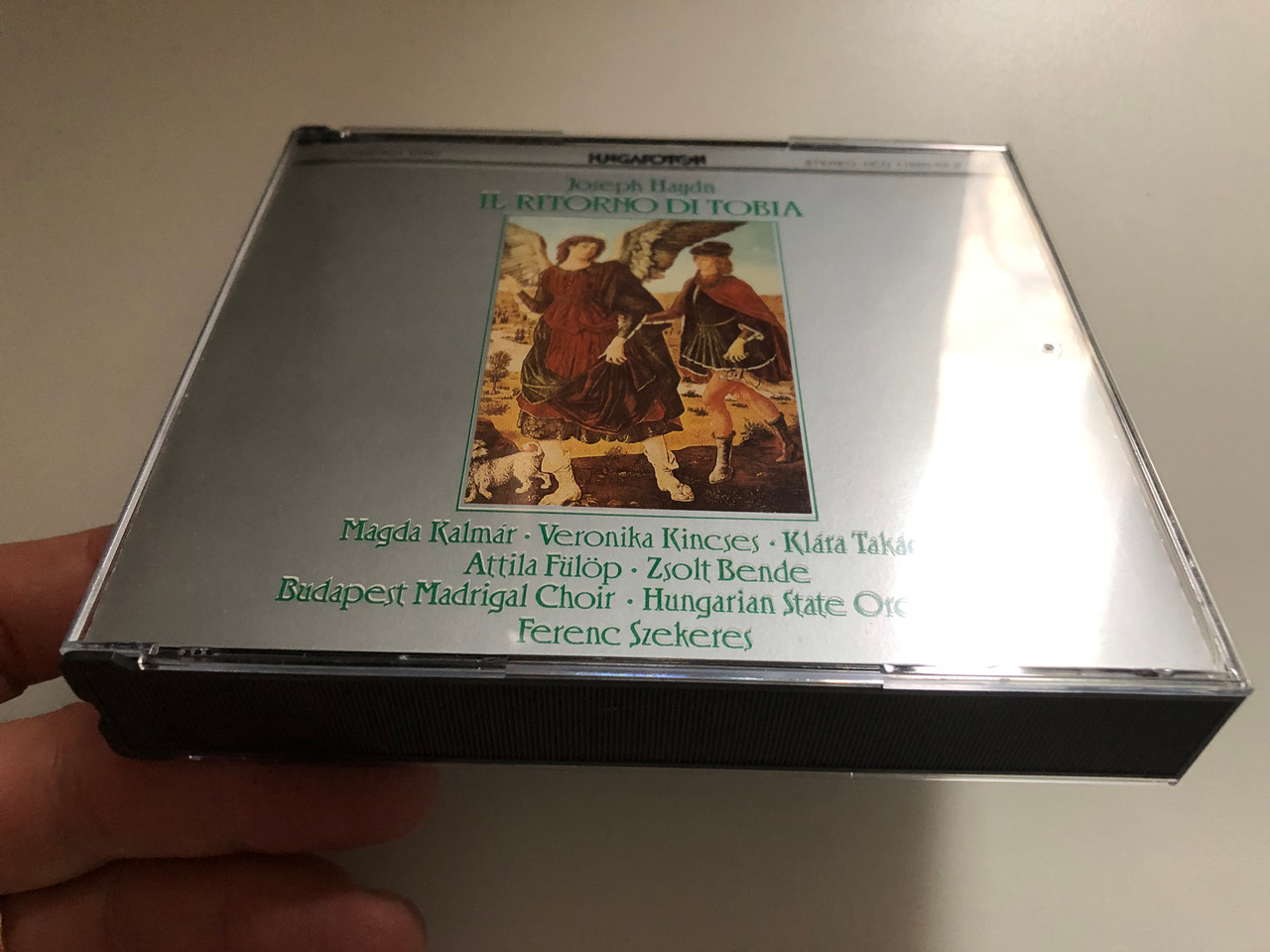Description
Joseph Haydn: Il Ritorno Di Tobia - Magda Kalmár, Veronika Kincses, Klára Takács, Attila Fülöp, Zsolt Bende, Budapest Madrigal Choir, Hungarian State Orchestra, Ferenc Szekeres / Hungaroton 3x Audio CD, Box Set 1987 Stereo
HCD 11660-62-2
Made in Japan
- ASIN : B00004VSJV
1987 reissue of the 1972 release. Joseph Haydn's Il Ritorno Di Tobia (the Retirn of Tobias). Performers include Zsolt Bende, Klara Takacs, Attila Fulop, Veronika Kineses, Magda Kalmar, with the Budapest Madrigal Choir, Hungarian State Orchestra conducted by Ferenc Szekeres. Founded in 1951 Hungaroton was the only record label & music publisher in Hungary for 40+ years.
1987 – Magda Kalmár (Raffaelle), Veronika Kincses (Sara), Klára Takács (Anna), Attila Fülöp (Tobia), Zsolt Bende (Tobit) – Budapest Madrigal Choir, Budapest State Orchestra, Ferenc Szekeres – 3 CDs (Hungaroton)
Il ritorno di Tobia (The Return of Tobias) is an oratorio in two parts composed in 1775 by Joseph Haydn (Hob. XXI:1). The work is the first oratorio the composer wrote and, according to Jones, was "his most extended and ambitious composition up to that time".
The Italian-language libretto of the work is by Giovanni Gastone Boccherini, brother of the composer Luigi Boccherini. This libretto is harshly criticized by Olleson, who notes that the author de-dramatizes vivid episodes in the source (the story of Tobit in the Apocrypha), depriving Haydn of the opportunity for highly dramatic musical utterance.
The work was premiered in Vienna on 2 April 1775, under the sponsorship of the Tonkünstler-Societät, a musician's benevolent society. The musical forces were substantial: Smither writes: "characteristic of the large forces used for the Tonkünstler-Societät concerts, the orchestra, chorus, and soloists possibly numbered more than 180 performers." He adds that the premiere was "enormously successful."
In 1784, Haydn substantially revised the work, with cuts to make numbers shorter and new choruses, for another of the Tonkünstler-Societät's benefit concerts. It is thought that at this concert Haydn first met Wolfgang Amadeus Mozart, who became his good friend. One of the soprano soloists was Nancy Storace, also a friend of Haydn, who later was Mozart's first Susanna in The Marriage of Figaro.
In 1808 the oratorio made a third appearance on the program of the Tonkünstler-Societät, this time in a revised version by the now-elderly composer's pupil, Sigismund Neukomm. The performance on the night of 22 December, which required the labors of most of the highly qualified musicians in Vienna, had regrettable consequences for a now-famous rival concert taking place in Vienna on the same evening, the benefit for Ludwig van Beethoven that premiered his Fifth and Sixth Symphonies.
Today, Il ritorno di Tobia is eclipsed by Haydn's later works in this genre – The Creation and The Seasons – and is seldom performed or recorded.
| Label: | Hungaroton – HCD 11660-62-2 |
|---|---|
| Format: |
3 x CD, Album, Box Set
|
| Country: | Hungary |
| Released: |
1987 |
| Genre: | Classical |
| Style: | Classical, Oratorio |
Tracklist:
| Il Ritorno di Tobia, Oratorio For 4 Soloists, Chorus & Orchestra, H. 21/1 | |||
| 1.1 | Overtüre | ||
|
Part One |
|||
| 1.2 | 1. Chor (& Anna, Tobit): Pietà... D'un Infelice | ||
| 1.3 | 2a. Rezitativ (Anna, Tobit): Né Comparisce, Oh Dio! | ||
| 1.4 | 2b. Arie (Anna): Sudò Il Guerriero, Ma Gloria Ottene | ||
| 1.5 | 3a. Rezitativ (Tobit): Deh modera il dolor / 3b. Arie (Tobit): Ah tu m'ascolta... | ||
| 1.6 | 4a. Rezitativ (Anna, Raphael): Non è Quello Azaria | ||
| 1.7 | 4b. Arie (Raphael): Anna, M'ascolta! | ||
| 1.8 | 5a. Rezitativ (Anna): Che Disse? / 5b. Arie (Anna): Ah Gran Dio! | ||
| 1.9 | 5c. Coro: Ah Gran Dio! | ||
| 2.1 | 6a. Rezitativ (Tobias, Sarah): Sara, Mia Dolce Sposa | ||
| 2.2 | 6b. Arie (Tobias): Quando Mi Dona Un Cenno | ||
| 2.3 | 7a. Rezitativ (Sarah): Somme Grazie To Rendo / 7b. Arie (Sarah): Del Caro Sposo... Son Fra Le Mura | ||
| 2.4 | 8. Rezitativ (Raphael, Tobit, Sarah, Anna, Tobias): Rivelarti A Dio Pacque Il Ver Sonno | ||
| 2.5 | 9. Tutti: Odi Le Nostre Voci | ||
|
Part Two |
|||
| 2.6 | 10a. Rezitativ (Anna, Sarah, Raphael): Oh Della Santa Fé Stupendi Effetti! | ||
| 2.7 | 10b. Arie (Raphael): Come Se A Voi Parlasse | ||
| 2.8 | 11a. Rezitativ (Anna, Sarah): Ad Azaria Nel Volto Rifulge | ||
| 2.9 | 11b. Arie (Sarah): Non Parmi Esser | ||
| 3.1 | 12a. Rezitativ (Anna, Tobias): Che Soave Parlar! | ||
| 3.2 | 12b. Arie (Tobias): Quel Felice Nocchier | ||
| 3.3 | 13a. Rezitativ (Anna): Giusta Brama L'affretta / 13b. Arie (Anna): Come In Sogno Un Stuol | ||
| 3.4 | 13c. Chor: Svanisce In Un Momento | ||
| 3.5 | 14a. Rezitativ (Tobias, Tobit, Rappael): Ah Dove Corri, O Padre? | ||
| 3.6 | 14b. Arie (Tobit): Invan Lo Chiedi | ||
| 3.7 | 15a. Rezitativ (Tobias, Anna): Che Fulmine Improvviso! | ||
| 3.8 | 15b. Duett (Tobias, Anna): Dunque, Oh Dio | ||
| 3.9 | 16. Rezitativ (Raphael, Sarah, Anna, Tobias, Tobit): Qui di Morir | ||
| 3.10 | 17. Chor (& Sarah, Anna, Tobias, Tobit): Io Non Oso Alzar |
- Alto Vocals [Anna] – Klára Takács
- Baritone Vocals [Tobit] – Zsolt Bende
- Chorus – Budapesti Madrigálkórus
- Composed By – Joseph Haydn, Joseph Haydn
- Conductor – Ferenc Szekeres
- Consultant – Gerd Schönfelder, Peter Gülke
- Engineer – Endre Radányi, Endre Radányi
- Harpsichord – Judith Várbíró
- Libretto By – Giovanni Gastone Boccherini
- Liner Notes – Péter Várnai
- Orchestra – Hungarian State Orchestra
- Producer – Dóra Antal
- Soprano Vocals [Raffaele (Raphael)] – Magda Kalmár
- Soprano Vocals [Sarah] – Veronika Kincses
- Tenor Vocals [Tobia (Tobias)] – Attila Fülöp
- Violoncello – László Szilvásy


































